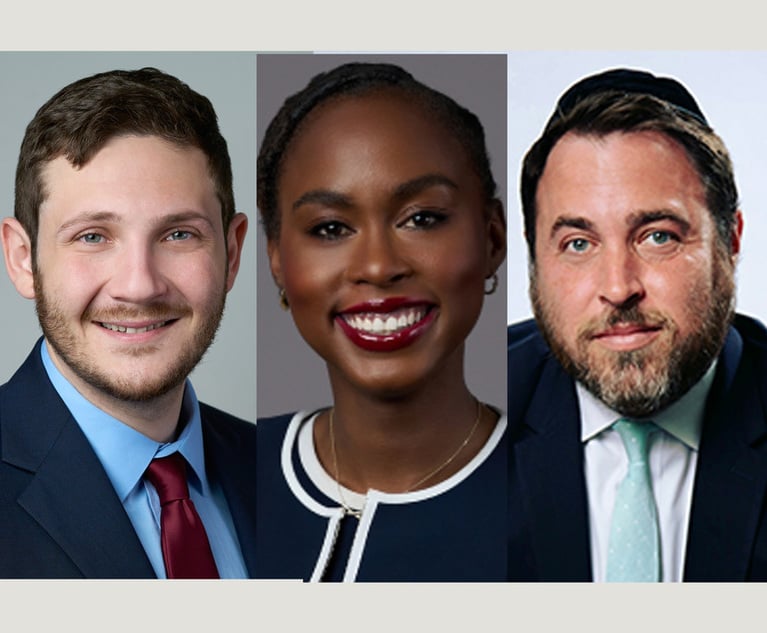Florida Supreme Court May Weigh Judges' Facebook Friendships
The case started as a dispute over unpaid legal fees.
October 18, 2017 at 03:02 PM
3 minute read

A new filing before the Florida Supreme Court could bring new scrutiny to jurists' social media activity, amid conflicting district court opinions.
It hinges on a nuance that could open the door to attorneys seeking greater access to judges' Facebook accounts to determine the extent of jurists' interaction with attorneys who appear before them, and if these “friendships” warrant recusal.
The filing comes in the case of a North Miami lawyer and his firm, who are asking the state Supreme Court to exercise its discretionary jurisdiction and step into the fray.
Insurance defense attorney Reuven T. Herssein and the Law Offices of Herssein And Herssein, which does business as Herssein Law Group, want a review of conflicting decisions from the Third and Fourth District Courts of Appeal. They argue judges appear biased when adjudicating cases involving Facebook friends—a notion the Third DCA rejected.
The case started as a dispute between Herssein and its former client, respondent United Services Automobile Association, for breach of contract and fraud over unpaid fees. It led to a push by Herssein to disqualify Miami-Dade Circuit Judge Beatrice Butchko over her social media connection to Israel Reyes, the attorney for a USAA executive accused of witness tampering.
A previous jurist, Judge Antonio Marin, had ordered an evidentiary hearing on the witness-tampering allegation. But the case transferred to Miami-Dade's Complex Business Litigation Division before that could happen and was assigned to Butchko, who refused to hold the evidentiary hearing.
Herssein suggests the judge's Facebook friendship with Reyes influenced her ruling.
Reyes did not immediately respond to requests for comment by deadline, and ethics rules prevent judges from commenting on pending litigation.
Herssein petitioned the Third District Court of Appeal for a writ of prohibition to disqualify Butchko, but the panel sided with the trial judge.
The opinion conflicts with a 2014 ruling from the Fourth DCA and two advisory opinions in 2009 and 2010 from the Judicial Ethics Advisory Committee.
“A random name drawn from a list of Facebook 'friends' probably belongs to a casual friend, an acquaintance, an old classmate, a person with whom the member shares a common hobby, a 'friend of a friend' or even a local celebrity like a coach,” Third DCA Judge Thomas Logue wrote, with Judges Ivan Fernandez and Edwin Scales concurring. “An assumption that all Facebook 'friends' rise to the level of a close relationship that warrants disqualification simply does not reflect the current nature of this type of electronic social networking.”
But now, Herssein suggests the court unintentionally left jurists open to scrutiny.
“It potentially opens the judge up to discovery of their social media communications to establish the degree of friendship,” he said.
This content has been archived. It is available through our partners, LexisNexis® and Bloomberg Law.
To view this content, please continue to their sites.
Not a Lexis Subscriber?
Subscribe Now
Not a Bloomberg Law Subscriber?
Subscribe Now
NOT FOR REPRINT
© 2024 ALM Global, LLC, All Rights Reserved. Request academic re-use from www.copyright.com. All other uses, submit a request to [email protected]. For more information visit Asset & Logo Licensing.
You Might Like
View All
Florida Supreme Court Paves Way for Attorney Fees Over $100k in Land Dispute

Miami’s Arbitration Week Aims To Cement City’s Status as Dispute Destination
3 minute read
Hit Song Ignites Multimillion-Dollar Legal Battle in South Florida

Ex-Big Law Attorney Disbarred for Defrauding $1 Million of Client Money
4 minute readTrending Stories
- 1Judge Denies Sean Combs Third Bail Bid, Citing Community Safety
- 2Republican FTC Commissioner: 'The Time for Rulemaking by the Biden-Harris FTC Is Over'
- 3NY Appellate Panel Cites Student's Disciplinary History While Sending Negligence Claim Against School District to Trial
- 4A Meta DIG and Its Nvidia Implications
- 5Deception or Coercion? California Supreme Court Grants Review in Jailhouse Confession Case
Who Got The Work
Michael G. Bongiorno, Andrew Scott Dulberg and Elizabeth E. Driscoll from Wilmer Cutler Pickering Hale and Dorr have stepped in to represent Symbotic Inc., an A.I.-enabled technology platform that focuses on increasing supply chain efficiency, and other defendants in a pending shareholder derivative lawsuit. The case, filed Oct. 2 in Massachusetts District Court by the Brown Law Firm on behalf of Stephen Austen, accuses certain officers and directors of misleading investors in regard to Symbotic's potential for margin growth by failing to disclose that the company was not equipped to timely deploy its systems or manage expenses through project delays. The case, assigned to U.S. District Judge Nathaniel M. Gorton, is 1:24-cv-12522, Austen v. Cohen et al.
Who Got The Work
Edmund Polubinski and Marie Killmond of Davis Polk & Wardwell have entered appearances for data platform software development company MongoDB and other defendants in a pending shareholder derivative lawsuit. The action, filed Oct. 7 in New York Southern District Court by the Brown Law Firm, accuses the company's directors and/or officers of falsely expressing confidence in the company’s restructuring of its sales incentive plan and downplaying the severity of decreases in its upfront commitments. The case is 1:24-cv-07594, Roy v. Ittycheria et al.
Who Got The Work
Amy O. Bruchs and Kurt F. Ellison of Michael Best & Friedrich have entered appearances for Epic Systems Corp. in a pending employment discrimination lawsuit. The suit was filed Sept. 7 in Wisconsin Western District Court by Levine Eisberner LLC and Siri & Glimstad on behalf of a project manager who claims that he was wrongfully terminated after applying for a religious exemption to the defendant's COVID-19 vaccine mandate. The case, assigned to U.S. Magistrate Judge Anita Marie Boor, is 3:24-cv-00630, Secker, Nathan v. Epic Systems Corporation.
Who Got The Work
David X. Sullivan, Thomas J. Finn and Gregory A. Hall from McCarter & English have entered appearances for Sunrun Installation Services in a pending civil rights lawsuit. The complaint was filed Sept. 4 in Connecticut District Court by attorney Robert M. Berke on behalf of former employee George Edward Steins, who was arrested and charged with employing an unregistered home improvement salesperson. The complaint alleges that had Sunrun informed the Connecticut Department of Consumer Protection that the plaintiff's employment had ended in 2017 and that he no longer held Sunrun's home improvement contractor license, he would not have been hit with charges, which were dismissed in May 2024. The case, assigned to U.S. District Judge Jeffrey A. Meyer, is 3:24-cv-01423, Steins v. Sunrun, Inc. et al.
Who Got The Work
Greenberg Traurig shareholder Joshua L. Raskin has entered an appearance for boohoo.com UK Ltd. in a pending patent infringement lawsuit. The suit, filed Sept. 3 in Texas Eastern District Court by Rozier Hardt McDonough on behalf of Alto Dynamics, asserts five patents related to an online shopping platform. The case, assigned to U.S. District Judge Rodney Gilstrap, is 2:24-cv-00719, Alto Dynamics, LLC v. boohoo.com UK Limited.
Featured Firms
Law Offices of Gary Martin Hays & Associates, P.C.
(470) 294-1674
Law Offices of Mark E. Salomone
(857) 444-6468
Smith & Hassler
(713) 739-1250






